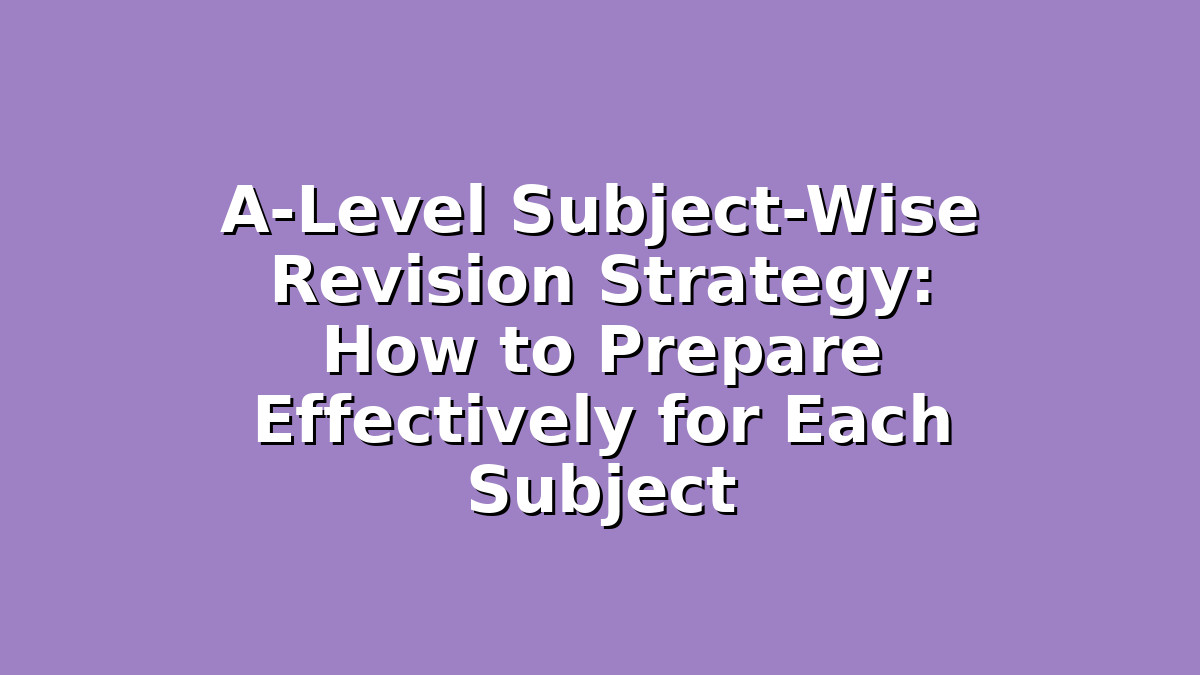Preparing for A-Level exams can feel overwhelming, especially when you have multiple subjects to revise for, each with its own unique content and exam style. However, having a clear, subject-wise revision strategy can make your study sessions more focused, efficient, and ultimately more successful. Whether you are aiming for top grades or simply want to improve your understanding, tailoring your revision approach to each subject is key.
In this article, we’ll guide you through effective revision strategies for different types of A-Level subjects, helping you to maximize your study time and boost your confidence. We’ll cover how to revise science subjects, humanities, and practical or essay-based subjects, and offer tips to keep you motivated throughout your revision journey.
—
1. Revising Science and Maths Subjects: Focus on Practice and Understanding
Science subjects like Biology, Chemistry, Physics, and Mathematics require a strong grasp of concepts as well as the ability to apply knowledge to problem-solving questions. Here’s how you can revise effectively for these subjects:
Understand Key Concepts Thoroughly
Before jumping into past papers, make sure you have a solid understanding of the fundamental concepts. Use your class notes, textbooks, and trusted online resources to clarify any topics you find difficult. Diagrams, flowcharts, and mind maps can be particularly helpful for visualizing processes in Biology or Chemistry.
Practice Problem-Solving Regularly
Science and Maths are “practice makes perfect” subjects. Solve a variety of questions from textbooks and past exam papers under timed conditions. This not only improves your problem-solving skills but also helps you get familiar with the exam format and time management.
Make Formula and Equation Flashcards
For Maths and Physics especially, memorizing formulas is essential. Create flashcards with formulas on one side and example problems on the other. Reviewing these regularly will help cement the formulas in your memory.
Review Mark Schemes and Examiner Reports
After practicing exam questions, check the mark schemes to understand what examiners expect. Some exam boards also release examiner reports that highlight common mistakes and tips—these are goldmines for improving your answers.
—
2. Revising Humanities Subjects: Develop Critical Thinking and Essay Skills
Subjects like History, Geography, English Literature, and Sociology require a different revision approach that emphasizes understanding themes, developing arguments, and practicing essay writing.
Create Thematic Revision Notes
Organize your notes by key themes, events, or theories rather than by textbook chapters. This helps you make connections and see the bigger picture, which is crucial for essay-based subjects. For example, in History, group your revision by historical periods or significant events, and in Geography, focus on physical vs. human geography topics separately.
Practice Writing Essays and Source Analysis
Regularly writing practice essays under exam conditions is one of the best ways to prepare. It helps you refine your argument structure, improve clarity, and manage your time effectively during the exam. For subjects like History and Geography, also practice analyzing sources and evidence critically, as these skills are often assessed.
Use Past Papers to Identify Question Styles
Past exam questions can vary widely. Reviewing them helps you spot recurring question types and practice tailoring your answers accordingly. For instance, English Literature exams might ask for close textual analysis or thematic essays, so preparing for both is important.
Discuss and Debate Topics
Engaging in discussions with classmates or teachers can deepen your understanding of complex ideas and develop your ability to articulate and defend your viewpoints—an essential skill for humanities exams.
—
3. Revising Practical and Coursework-Based Subjects: Balance Revision and Practical Skills
Some A-Level subjects like Art, Design Technology, Drama, or Music involve practical coursework alongside written exams. Your revision strategy for these subjects needs to balance theory revision with ongoing project work.
Plan Your Coursework Early and Regularly
For subjects with coursework, start early and set realistic goals for each stage of your project. Regular progress checks help avoid last-minute stress and ensure you have ample time for improvements.
Review Theory and Contextual Studies
Theory exams often test your knowledge of techniques, historical context, or technical terminology. Make concise revision notes for key theories and context relevant to your practical work. For example, Art students might revise different art movements, while Drama students review playwrights and theatrical styles.
Practice Practical Skills Consistently
Dedicate time each week to practicing the practical skills required by your subject. Whether it’s drawing, composing music, or rehearsing a performance, consistent practice improves your confidence and performance quality.
Seek Feedback and Reflect
Regularly ask for feedback from teachers and peers on your coursework and practical skills. Reflection on this feedback allows you to make targeted improvements, which can significantly enhance your final grades.
—
Conclusion: Stay Consistent, Stay Positive
Effective revision for A-Level exams doesn’t happen overnight. It requires planning, consistent effort, and adapting your strategies to suit each subject’s demands. Create a revision timetable that balances all your subjects, incorporates breaks, and allows flexibility for extra focus where needed.
Remember, setbacks and difficult topics are normal, so stay positive and seek support when you need it. Use these subject-wise strategies to make your revision smarter, not harder, and approach your exams with confidence.
Believe in your ability to succeed—you’ve got this!
—

Responses